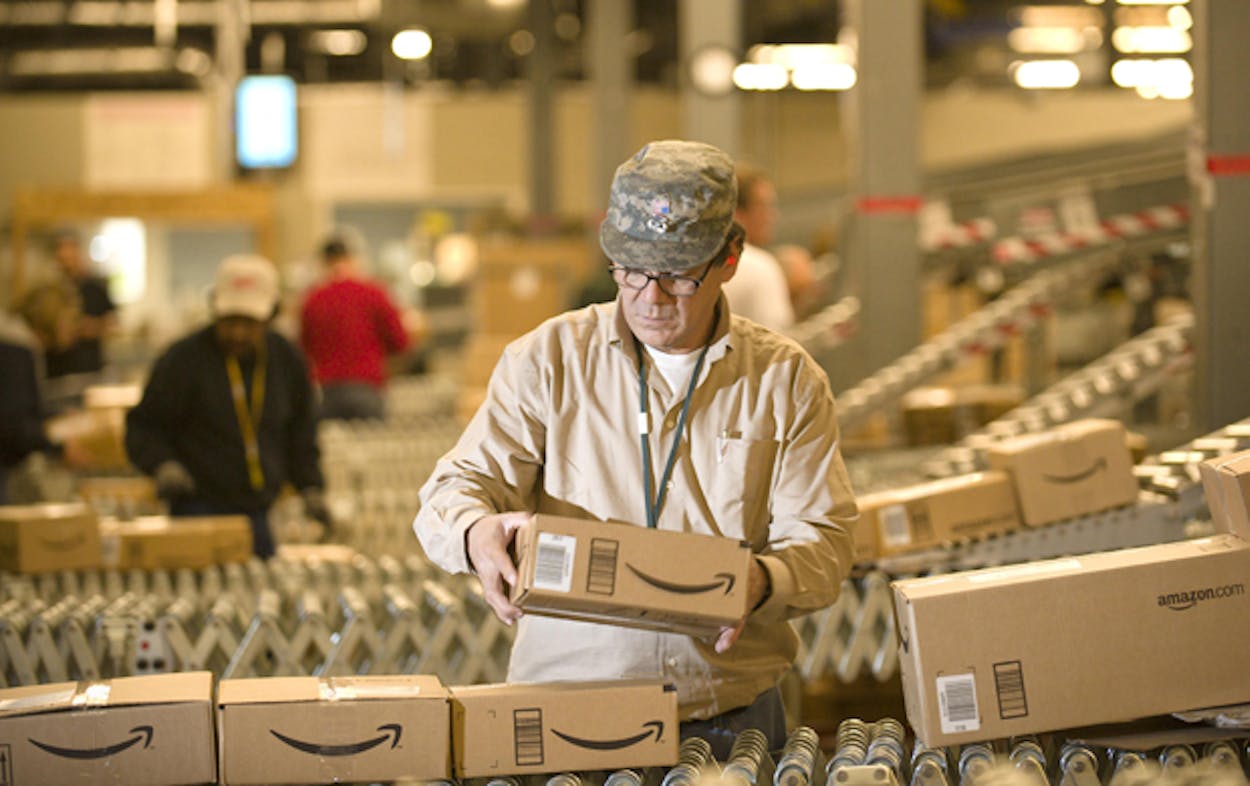The Texas economy is one of the most robust in the world. Wildly profitable companies and ingenious entrepreneurs call this state home, and what happens here influences businesses around the nation. Here’s a slice of the profits, losses, big deals, and backroom decisions happening across Texas this week.
Amazon to Tax Texans
After years of butting heads with state officials, Amazon has agreed to begin collecting sales taxes on online purchases in Texas beginning July 1. Comptroller Susan Combs announced today that as part of the agreement, Amazon has promised to “create at least 2,500 jobs and make at least $200 million in capital investments” in Texas in the next four years.
Combs had accused Amazon of failing to pay $269 million in sales taxes from 2005 to 2009, Ross Ramsey reported at the Texas Tribune. Amazon disputed the figure and threatened to close its distribution warehouse in Irving before discussions unraveled in last year’s legislative session. State lawmakers rejected the company’s previous offer to invest $300 million to create some 6,000 jobs in exchange for a four-year moratorium on paying sales taxes.
The Bottom Line: Amazon recently cut similar deals for sales tax moratoriums in South Carolina and California, and it is currently in talks with other states. In today’s announcement, Combs called for “federal legislation that will give states access to revenues that are already due, which would resolve this issue fairly for all retailers and all states.”
How Now, Downed Cow?
Texas beef producers are downplaying concerns about a report of mad cow disease in California this week, the first case in the U.S. since 2006. The disease only affected one cow that was not slated for human consumption, StateImpact Texas reported. Texas Agriculture Commissioner Todd Staples issued a statement assuring consumers that “Texas beef is as safe as ever.”
It remains to be seen whether this incident will have an effect on beef prices. Reports of mad cow disease sent the beef market spiraling in 2003, and the industry has been gradually recovering ever since. But there has already been a small rebound in the beef futures market since the announcement earlier this week, and the top importers of U.S. beef have already announced they do not plan to put a hold on purchases, according to Bloomberg Businessweek.
The Bottom Line: The global beef market has evolved significantly since the last mad cow scare, and experts predict that this week’s development will not be nearly as devastating. “Importers are more dependent on U.S. beef than they were in 2003,” and many of them have shipping policies that account for the possibility of this type of scenario, Bloomberg Businessweek reported.
Radiation Location Prompts Trepidation
State regulators signed off on a proposal this week that will allow radioactive nuclear waste to be buried at a site in West Texas near the New Mexico border. The Associated Press reported that the site, located about 360 miles west of Dallas, “will be the final resting place for low-level radioactive waste from 38 states,” and “a separate site nearby will handle radioactive waste from federal sites around the country.”
Environmental groups are concerned that the dump site could contaminate the groundwater in nearby wells. Texas Commission on Environmental Quality officials say that risk of contamination is low as long as the nuclear materials are buried more than 100 feet away from the water.
The Bottom Line: The site, operated by Dallas-based Waste Control Specialists LLC, is the first low-level radioactive waste dump to open in 30 years and the first in the nation to be cleared to handle all types of nuclear debris, the AP reported.
Exxon the Line
It’s been an up-and-down week for Exxon Mobil. The Irving-based energy company reported an 11 percent drop in first-quarter earnings — its first quarterly decline in nearly three years. CBS Moneywatch also reported that Exxon’s oil production decreased by 7.7 percent and natural gas production fell by 3.4 percent.
However, the energy giant also increased its dividend payout to shareholders by 21 percent, “making it the biggest corporate dividend payer” in the world, according to CBS.
The Bottom Line: Exxon’s future outlook is also mixed. Plummeting natural gas prices are making it less cost-effective to for the company to keep operating all of its gas fields, while ConocoPhillips and Chesapeake Energy have already shut down many of their rigs.
Winner of the Week: IPOs
According to a new analysis by Ernst & Young, Texas companies registered for initial public offerings in the first quarter of the year, the second-most of any state in the U.S. The companies are seeking a total of $6.2 billion, “second only to California, which had 33 companies seeking $8.2 billion,” according to the Houston Business Journal. Nationally, the number of IPO filings increased by 31 percent since the same quarter last year.
Loser of the Week: Your Lungs
Houston got bad marks from the American Lung Association this week, ranking eighth on a list of the country’s smoggiest metro areas. Dallas didn’t fare much better, coming in at No. 12 in ozone pollution rankings. The Houston Business Journal reported that more than 127,000 children and 322,000 adults suffer from asthma in Houston.






